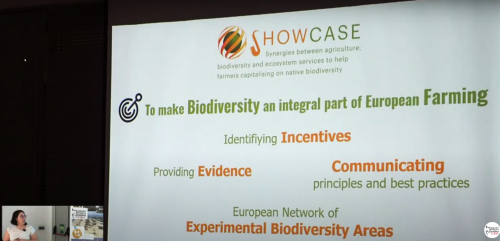SHOWCASE member Dr. Elena Velado-Alonso, representing CSIC, recently gave a presentation on her work within the project at a seminar held by Estación Biológica de Doñana, titled The SHOWCASE experience: Science communication, co-design & results from the Spanish intervention. The seminar presented the Spanish experience addressing important aspects for effective scientific communication on farmland biodiversity conservation and how to successfully collaborate with farmers to co-design an ecological intervention aiming to improve farmland biodiversity.
Elena’s presentation focused on three key areas, namely effective scientific communication through narratives, the social process of knowledge exchange with farmers and the project’s results.
Beginning with effective scientific communication, Elena noted its complexity due to the varied number of stakeholder groups that bring different viewpoints - from farmers to consumers. She pointed out that at times scientists’ lack of training in communication constitutes a complication, which impedes efficient message delivery, despite the best efforts of both sides. For this reason, Elena’s team at SHOWCASE has proposed the use of narratives for effective scientific communication, which presents events in a logical manner and improves understanding among relevant stakeholders. This approach has been adopted by the SHOWCASE project in its communication, dissemination and exploitation plan.
In her talk, Elena also touched upon one of SHOWCASE’s objectives, namely setting up an Experimental Biodiversity Area (EBA) network, which are collaborative regions that bring together farmers, researchers, NGOs and citizens to develop and evaluate biodiversity innovations, enhancing sustainability and resilience in agriculture. She discussed the challenges stemming from the process of co-design with farmers and farm cooperatives and how the agricultural context affected that process, e.g. energy crisis, economic inflation, and transport strikes in Spain in 2022. Despite these challenges, Elena noted that co-design with farmers and researchers collaborating and sharing power and responsibility in the creation of knowledge proved to be a fruitful endeavour. The findings originating from this collaboration are available here.
The final point that Elena focused on is a study conducted in intensive orchards, which explored how unproductive areas can support biodiversity without affecting yield. The study revealed significant biodiversity, including plants, spiders, and pollinators, with spontaneous vegetation being cost-effective. It found that management intensity affects biodiversity, with more intensive farms supporting more pollinators, concluding that intensive farms can enhance biodiversity without reducing yields, though impacts vary by species.
The full talk that Elena provided is available here.
Image: Dr. Elena Velado-Alonso presenting insights from SHOWCASE at Estación Biológica de Doñana.
